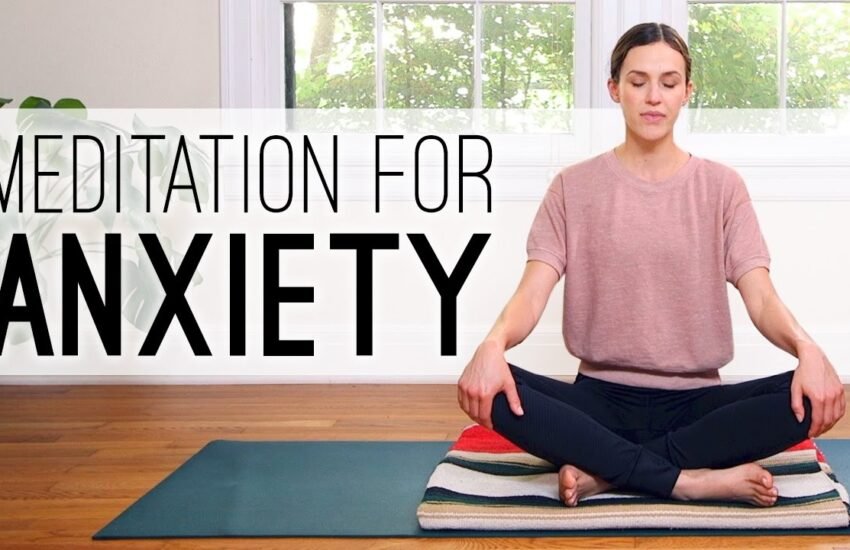Many people are investigating the significant advantages of meditation for anxiety as a result of the hunt for natural cures in today’s fast-paced society, when stress and worry are commonplace companions. People are resorting more and more to age-old meditative techniques in an attempt to achieve peace and tranquility among the tumult of contemporary life. With its origins firmly ingrained in many different cultural and spiritual traditions, meditation provides a special and approachable method of anxiety management.
Through the cultivation of mindfulness and the promotion of an acute awareness of the present moment, meditation is a potent tool for overcoming everyday obstacles. We set out on a journey that transcends the temporal confines of our busy reality as we explore the domains of anxiety meditation, leading us to a peaceful sanctuary within ourselves. Explore the mutually beneficial relationship between meditation and anxiety alleviation as we uncover the transformational potential of this age-old practice.

Quick Navigation
The Process Underpinning the Anxiety-Relieving Effect of Meditation
By affecting the complex interactions that exist between the mind and body, meditation functions as a comprehensive strategy for managing anxiety. It sets off the parasympathetic nervous system and the relaxing response. This creates a physiological environment that is conducive to serenity by counteracting the physiological signs of worry, such as raised blood pressure and heart rate. Additionally, practicing mindfulness in meditation helps people see their nervous thoughts without getting sucked into them. This promotes emotional regulation and acts as a mental defense against the stresses of everyday life.
Meditation: Any Level of Experience Is Beneficial for Anxiety
The fact that meditation is accessible to everyone is one of its most alluring features. Anyone can adopt this practice, regardless of their past meditation experience. Beginners may find comfort in guided meditations, in which a knowledgeable instructor guides them through the practice while providing cues for relaxation and focused concentration. Expert meditators can experiment with more advanced methods such as transcendental meditation or Vipassana. Finding a method that suits each person’s tastes and comfort level is crucial to using meditation as a universal technique for anxiety reduction.
Read Also: 15 PHD Scholarships for Zambia Students 2024-2025
Examining Efficient Methods for Handling Anxiety
There are many different types of meditation, and each one offers a different strategy to deal with anxiety. One of the main components of anxiety reduction is mindfulness meditation, which entails focused attention to the present moment. This can be done by scanning your body, paying attention to your breath, or observing your physical feelings.
Kindness and love By cultivating feelings of compassion towards oneself and others, meditation, on the other hand, counteracts the negativity that anxiety is typically linked to. Deep relaxation is widely achieved through the quiet mantra repetition of transcendental meditation. The range of approaches guarantees that people can customize their practice to fit their unique requirements and inclinations.
Scientific Verification of Meditation’s Anxiety-Reduction Effects
An increasing amount of empirical data supports the spike in interest in meditation as a treatment for anxiety. After regular meditation practice, neuroimaging studies utilizing methods like functional MRI show observable changes in brain activity linked to decreased anxiety. The amygdala, a brain region involved in stress processing, shows changes in its activity, suggesting that meditation improves emotional control.
The effectiveness of meditation in lowering anxiety levels has been repeatedly shown by meta-analyses that synthesize results from several studies. The scientific community affirms that meditation is an effective adjunct to traditional anxiety treatments, demonstrating the method’s validity as a technique supported by data.
The Secret to Unlocking the Benefits of Meditation: Patience and Consistency
Starting a meditation practice to reduce anxiety necessitates a readiness to accept patience and persistence. Although some people may notice little changes in their stress levels after only a few sessions, the full range of advantages usually becomes apparent over time. Research indicates that after eight weeks of consistent practice, considerable improvements frequently occur. That being said, the trip should take precedence over the final destination. Regular meditation practice can bring about long-lasting changes in an individual’s perception and management of anxiety. It is not a quick remedy, but rather a progressive and transformative process.
Read Also: 15 Best Driving Schools in Hemet | 2024 Review + Website
Difficulties and Myths: Making Your Way to Serenity
There may be difficulties and misunderstandings when incorporating meditation into a practice for managing anxiety. The idea that one must stop thinking during meditation is one of the most widespread misconceptions. In actuality, it entails recognizing ideas without passing judgment on them and making mental room for observation and release. One more obstacle is the idea that meditation takes a lot of time.
Individuals with hectic schedules might nevertheless benefit much from even short, frequent sessions. At first, resistance may manifest itself, particularly in those who are used to a fast-paced existence. Dispelling myths, lowering expectations, and realizing that the transformational impact of meditation happens gradually with regular practice are necessary to overcome these obstacles.
Tailoring the Experience: Individualization for the Best Outcomes
Customization is the key to successfully integrating meditation into a regimen for managing anxiety. Since every person’s journey is different, adaptability is essential. Customizing meditation routines to individual preferences increases the chance of prolonged involvement. Examples of this include selecting a technique, length of time, or integrating mindfulness into everyday activities. Recognizing that there is no one-size-fits-all method, people can design a meditation practice that suits their preferences and way of living, making it more pleasurable and productive.
Choosing Calm Through Meditation to Alleviate Anxiety
To sum up, anxiety meditation is a tried-and-true method of developing inner calm that has the backing of science rather than being a passing fad. Its method for relieving anxiety, along with its accessibility to all people and variety of ways, make it a useful tool for anyone looking to reduce their anxiety.
Its credibility is bolstered by scientific validation, which highlights its value as a beneficial adjunct to traditional treatments. Encouraging patience, consistency, and customisation as people begin their journey towards anxiety meditation guarantees a life-changing experience and unlocks the full potential of this age-old practice for contemporary well-being.
Read Also: Carey Baptist College | Review, Tuition, Admission, Programs
How might meditation aid in the reduction of anxiety?
Stress has two distinct aspects: the physiological and the psychological. Meditation for anxiety addresses both of these aspects of stress. Meditation combats the ‘fight or flight’ stress response by eliciting a relaxation response and stimulating the parasympathetic nervous system. This eases tension in the muscles, lowers blood pressure, and encourages a calmer frame of mind.
Additionally, by encouraging attention and enabling people to notice worrisome thoughts without being sucked into them, meditation improves emotional control. With consistent practice, people become more conscious of their mental processes and learn how to reframe the negative thinking patterns that lead to worry.
Is it possible for anyone to meditate for anxiety, no matter how experienced they are?
Indeed. Everyone, regardless of experience level, can benefit from the practice of meditation for anxiety. The basic principles of meditation do not change, regardless of your level of experience. A range of methods accommodate different tastes, so that everybody, no matter what level of experience, can discover a method that works for them.
Beginners can be accommodated with specialized guided meditations, mindfulness exercises, or basic breath awareness activities that offer a gentle introduction to the practice. The secret is to be consistent and to have an open mind so that people can customize meditation to their own requirements and comfort levels.
Which particular forms of meditation work best for anxiety relief?
A variety of methods, each with advantages of its own, are available for meditation for anxiety. Particularly beneficial is mindfulness meditation, which is characterized by concentrated attention on the here and now. One method to divert attention from worried thoughts is to observe the breath, feel the sensations, or practice body scan meditations. By fostering compassion and optimism, loving-kindness meditation combats the negativity that is frequently connected to anxiety.
The practice of transcendental meditation, which is distinguished by the quiet recitation of a mantra, is another strategy with a reputation for lowering anxiety. People might find the approach that most connects with them by trying out several tactics.

Does the effectiveness of meditation in lowering anxiety have scientific backing?
Indeed, a large body of scientific data confirms that meditation effectively reduces anxiety. It has been shown in numerous studies to have a good effect on mental health. A regular meditation practice leads to changes in brain activity that are related with decreased anxiety, as shown by functional MRI scans. Additionally, studies show that meditation has an impact on the amygdala, a part of the brain essential for managing stress and emotions.
Furthermore, a number of research’ meta-analyses have repeatedly demonstrated that meditation is linked to a considerable decrease in anxiety. The medical profession supports meditation as a useful adjunctive strategy for managing anxiety and frequently suggests it in addition to other therapies.
How long does it usually take to feel the effects of anxiety-reduction meditation?
Each person experiences the advantages of meditation for anxiety in a different time frame. After just a few sessions, some people may experience slight changes in their stress levels, while others could need longer sessions. Since the cumulative benefits of regular meditation become more noticeable with time, consistency is essential. Research indicates that after eight weeks of regular practice, significant improvements frequently take place.
But, it’s crucial to approach meditation with tolerance and an open mind, realizing that the path to less anxiety is a slow, transforming one rather than a quick fix.
Recommended
- Top Iron Ore Mines in Minnesota
- Total Review: The Royal College of Surgeons in Ireland (RCSI)
- Te Kupenga Catholic Leadership Institute | Review, Tuition, Admission, Programs
- Te Rau Kahikatea | Review, Tuition, Admission, Programs
Is there anything wrong with the way that incorporating meditation into an anxiety treatment regimen may go wrong?
There are obstacles and misunderstandings to clearing up when incorporating meditation into an anxiety management regimen. One prevalent misperception about meditation is that it necessitates total mind cessation. In actuality, it entails recognizing ideas without passing judgment and making room to notice and let go of them. The idea that meditation takes a lot of time is another obstacle.
Regular, even short sessions might have positive effects. At first, resistance could surface since people used to a fast-paced existence might find it hard to accept stillness. Dispelling myths, lowering expectations, and realizing that the transformational impact of meditation happens gradually with regular practice are necessary to overcome these obstacles.
SEE ALSO:
Trust you found our article on Review On Meditation For Anxiety helpful. Follow our website for more interesting articles.

